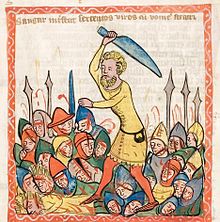Shamgar
| Shamgar | |
|---|---|

Medieval depiction of Shamgar
|
|
| Born | 13th century BCE |
| Died | 12th century BCE |
| Occupation | Third Judge of Israel |
| Predecessor | Ehud |
| Successor | Deborah |
Shamgar, son of Anath (Hebrew: שַׁמְגַּר Šamgar), is the name of one or possibly two individuals named in the Book of Judges. The name occurs twice; at the first mention Shamgar is identified as a Biblical Judge, who repelled Philistine incursions into Israelite regions, and slaughtered 600 of the invaders with an ox goad, the other mention is within the Song of Deborah, where Shamgar is described as having been one of the prior rulers, in whose days roads were abandoned, with travelers taking winding paths, and village life collapsing.
Unlike the descriptions of other Biblical Judges, the first reference to Shamgar has no introduction, conclusion, or reference to the length of reign, and the subsequent text follows on directly from the previous narrative. In several ancient manuscripts this reference to Shamgar occurs after the accounts of Samson rather than immediately after the account of Ehud, in a way that is more narratively consistent; scholars believe that this latter position is more likely to be the passage's original location.
The act of this Shamgar is similar to that of Shammah, son of Agee, mentioned in the appendix of the Books of Samuel as being one of The Three, a distinct group of warriors associated with King David. Scholars believe that the same individual is meant, and that the passage in the book of Judges moved to its present location as a result of the mention of a Shamgar in the subsequent (to the present position) Song of Deborah. Scholars also believe that the name of the individual may originally have been Shammah, and became corrupted under the influence of the Shamgar in the Song of Deborah. The term translated as oxgoad is a biblical hapax legomenon, the translation into English being made on the basis of the Septuagint's translation into Greek.
...
Wikipedia
